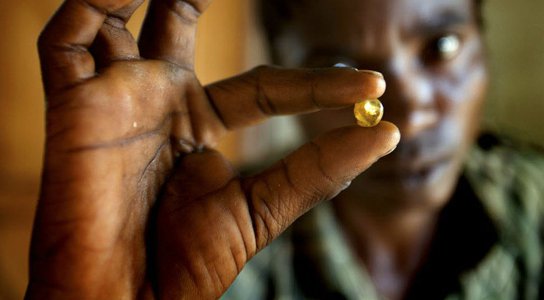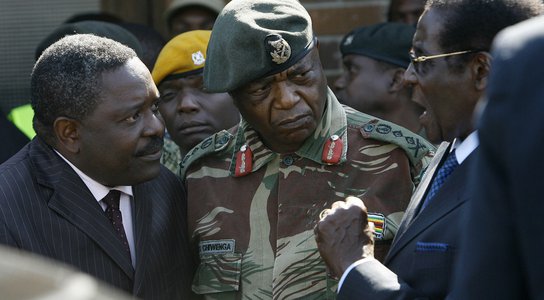This piece was originally published on Africa Portal.
Recent unprecedented events in Zimbabwe undoubtedly offer the country a rare chance for a break with the past. Its beleaguered economy has a chance for revival, while its jubilant population eye political reforms that deliver them a greater say in how their country is run. But change in Zimbabwe will depend on much more than who sits behind the president’s desk.
While the military commanded global attention during the dramatic sequence of events that saw Emmerson Mnangagwa—‘the Crocodile’—return to power just seventeen days after being ousted as Vice-President, their role in Zimbabwe’s politics is nothing new.
Zimbabwe’s security forces have been widely implicated in partisan political behaviour and electoral interference, including voter intimidation and violence targeting opposition figures. Their support has been critical to sustaining the power of both the president and the party. And once more, it is the security forces—not the ballot-box—that have played a decisive role in shaping Zimbabwe’s political landscape.
Powerful forces remain stacked against genuine change in Zimbabwe. Other moments of political promise – including a government of national unity - have come and gone; most of them scuppered by a ruling party, security sector and economy built to resist change. These too are in need of urgent reform if Zimbabwe is to chart a new and better course.
While bonds between the military and the ruling party were initially forged during the liberation struggle, this relationship has increasingly been shaped by entwined economic interests, including access to Zimbabwe’s vast natural resource wealth.
Zimbabwe’s once promising diamond sector offers a particularly vivid example of how these vested economic interests have played out to the detriment of Democracy.
In what turned out to be his final year in office, then-President Mugabe decried the loss of billions in diamond revenues. With the benefit of hindsight, it is tempting to view these belated complaints as the cynical indignation of a man losing control of a machine of his own making. While billions were promised—Mugabe himself spoke of US$15 billion—official exports since 2010 have totalled just over US$2.5 billion, with only around US$300 million in diamond revenues clearly identifiable in government budgets.
The military, alongside another highly partisan arm of the country’s security services—the feared Central Intelligence Organisation (CIO)—have been among the principal beneficiaries of Zimbabwe’s diamonds. They are linked to at least three of the joint venture companies that dominated Zimbabwe’s diamond sector prior to the stuttering amalgamation process that has sought to create a single Zimbabwe Consolidated Diamond Company (ZCDC), the shareholdings in which remain unclear.
Through murky joint venture agreements, anonymously held companies registered in off-shore secrecy jurisdictions, and a concerted effort to stifle all domestic calls for transparency and reform, millions appear to have by-passed the Treasury and funnelled directly to the security services.
This not only deprived Zimbabwe’s increasingly impoverished population of their rightful share of these riches, it has had a significant impact on their country’s democratic prospects over the last decade.
Access to an independent and off-budget source of financing liberates these powerful security forces from the democratic and civilian control the national budget brings, enabling them to pursue of their own agenda with limited accountability and oversight.
In 2012, it was alleged that the Central Intelligence Organisation (CIO) specifically allocated diamond revenues to operations aimed at discrediting opposition leaders ahead of elections.
Furthermore, once security forces are given access to lucrative resources like diamonds—and grow accustomed to the independence they bring—they inevitably seek to hold on to them. This gives these powerful institutions a dangerous economic interest in the outcome of the political process, as well as the means to intervene.
Zimbabwe’s new president appears well aware of the advantages such funding can bring.
In 2001 the UN identified Emmerson Mnangagwa as the “architect” of Zanu-PF’s commercial activities in the Democratic Republic of Congo in the late 1990s—a time during which numerous groups stand accused of looting the country’s natural riches, including gold and diamonds. Meanwhile, Zimbabwe’s involvement in the conflict was reported to have sucked millions from the public purse, contributing to the country’s emerging economic crisis.
The optimistic vision of Zimbabwe’s future features a new president, party, and military all willing to put the interests and will of Zimbabwe’s people above personal power and gain. The reform of Zimbabwe’s security sector and murky mining industry is closely linked to the prospects of this vision.
While it is for Zimbabwe’s people to shape their political future, the international community and its companies have an important role to play in supporting these critical reforms. Indifference from the companies that trade in Zimbabwe’s diamonds must be turned to calls for reform in support of those who have campaigned locally, for many years, for greater transparency and governance reform. And donors and states pondering economic support at this moment of hope must insist on meaningful change also to the hidden forces that have shaped Zimbabwe’s political landscape for decades. President Mnangagwa’s recent call for the return of assets stashed abroad by Zimbabwe’s powerful elites will need the support of an international financial system that aided their secret flight.
Without greater transparency and governance reform, real democratic progress may remain elusive. Reforming Zimbabwe’s partisan security sector and opaque mining industry will be key to determining whether the new president makes good on his promise of change.


